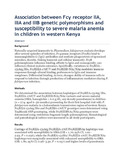| dc.contributor.author | Munde, Elly O. | |
| dc.contributor.author | Okeyo, Winnie A. | |
| dc.contributor.author | Raballah, Evans | |
| dc.contributor.author | Anyona, Samuel B. | |
| dc.contributor.author | Were, Tom | |
| dc.contributor.author | Ong’echa, John M. | |
| dc.contributor.author | Perkins, Douglas J. | |
| dc.contributor.author | Ouma, Collins | |
| dc.date.accessioned | 2021-06-03T14:00:35Z | |
| dc.date.available | 2021-06-03T14:00:35Z | |
| dc.date.issued | 2017-04-20 | |
| dc.identifier.uri | https://doi.org/10.1186/s12879-017-2390-0 | |
| dc.identifier.uri | https://bmcinfectdis.biomedcentral.com/articles/10.1186/s12879-017-2390-0 | |
| dc.identifier.uri | http://r-library.mmust.ac.ke/123456789/1570 | |
| dc.description.abstract | Background
Naturally-acquired immunity to Plasmodium falciparum malaria develops after several episodes of infection. Fc gamma receptors (FcγRs) bind to immunoglobulin G (IgG) antibodies and mediate phagocytosis of opsonized microbes, thereby, linking humoral and cellular immunity. FcγR polymorphisms influence binding affinity to IgGs and consequently, can influence clinical malaria outcomes. Specifically, variations in FcγRIIA -131Arg/His, FcγRIIIA-176F/V and FcγRIIIB-NA1/NA2 modulate immune responses through altered binding preferences to IgGs and immune complexes. Differential binding, in turn, changes ability of immune cells to respond to infection through production of inflammatory mediators during P. falciparum infection.
Methods
We determined the association between haplotypes of FcγRIIA-131Arg/His, FcγRIIIA-176F/V and FcγRIIIB-NA1/NA2 variants and severe malarial anemia (SMA; hemoglobin < 6.0 g/dL, any density parasitemia) in children (n = 274; aged 6–36 months) presenting for their first hospital visit with P. falciparum malaria in a holoendemic transmission region of western Kenya. FcγRIIA-131Arg/His and FcγRIIIA-176F/V genotypes were determined using TaqMan® SNP genotyping, while FcγRIIIBNA1/NA2 genotypes were determined using restriction fragment length polymorphism. Hematological and parasitological indices were measured in all study participants.
Results
Carriage of FcγRIIA-131Arg/FcγRIIIA-176F/FcγRIIIBNA2 haplotype was associated with susceptibility to SMA (OR = 1.70; 95% CI; 1.02–2.93; P = 0.036), while the FcγRIIA-131His/ FcγRIIIA-176F/ FcγRIIIB NA1 haplotype was marginally associated with enhanced susceptibility to SMA (OR: 1.80, 95% CI; 0.98–3.30, P = 0.057) and higher levels of parasitemia (P = 0.009). Individual genotypes of FcγRIIA-131Arg/His, FcγRIIIA-176F/V and FcγRIIIB-NA1/NA2 were not associated with susceptibility to SMA. | en_US |
| dc.language.iso | en | en_US |
| dc.publisher | BMC Infectious Diseases | en_US |
| dc.subject | Fcγ receptor IIA, IIIA ,IIIB, genetic, polymorphisms severe malaria, anemia, children | en_US |
| dc.title | Association between Fcγ receptor IIA, IIIA and IIIB genetic polymorphisms and susceptibility to severe malaria anemia in children in western Kenya | en_US |
| dc.type | Article | en_US |

